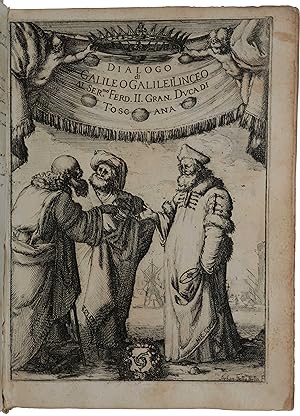About this Item
PMM 128 - 'EPPUR SI MUOVE'. First edition, a fine, unrestored copy in contemporary binding with noble provenance, of this epoch-making work, Galileo's celebrated defence of the Copernican view of the solar system, the most notorious banned book of the 17th century. In 1624 the new pope Urban VIII (Maffeo Barberini, 1568-1644), Galileo's friend, admirer and patron for more than a decade, granted him permission to discuss the Copernican system in a book, "provided that the arguments for the Ptolemaic view were given an equal and impartial discussion" (DSB). Galileo's Dialogo was finished in 1630, and Galileo sent it to the Roman censor. Because of an outbreak of the plague, communications between Florence and Rome were interrupted, and Galileo asked for the censoring to be done instead in Florence. The Roman censor had a number of serious objections to the book and forwarded these to Florence. After writing a preface which claimed that what followed was written hypothetically, Galileo had little trouble getting the book through the Florentine censors. The work was presented in the form of a dialogue between three protagonists, Salviati, an advocate of the Copernican theory, Simplicio, an upholder of the Ptolemaic orthodoxy and generally interpreted as representing Pope Urban VIII, and Sagredo, an impartial educated layman who acts as adjudicator. While his preface ostensibly supported the anti-Copernicans, the dialogue device permitted Galileo to present without disguise his true views of the cosmos. The work "was designed both as an appeal to the great public and as an escape from silence . it is a masterly polemic for the new science. It displays all the great discoveries in the heavens which the ancients had ignored; it inveighs against the sterility, wilfulness, and ignorance of those who defend their systems; it revels in the simplicity of Copernican thought and, above all, it teaches that the movement of the earth makes sense in philosophy, that is, in physics . The Dialogo, more than any other work, made the heliocentric system a commonplace" (PMM). "The Dialogo, far more than any work, convinced men of the truth of the Copernican system" (Gingerich). Pope Urban VIII was not persuaded, however, and immediately convened a special commission to examine the book and make recommendations. In casting the Pope as the simple-minded Aristotelian Simplicio, Galileo br ought upon himself arrest, trial by the Inquisition and life imprisonment. The sentence was commuted to permanent house arrest, while the printing of any of his works was forbidden. The Dialogo remained on the index until 1832. Provenance: Paolo Borghese, 9th Prince of Sulmona (1844-1920), bibliophile and gastronome (bookplate on front paste-down). Involved in the building speculation of the late nineteenth century in Rome together with his brother-in-law Prince Rodolfo Boncompagni Ludovisi, he was forced to sell a large part of his assets, including the Palazzo Borghese, purchased in 1901 by the Italian state. His library was sold at auction in Rome, 16 May - 7 June, 1892: the present copy of the Dialogo was lot 597 in the sale catalogue (); manuscript list of quotations on verso of front fly-leaf taken from Melchior Inchofer's Tractatus Syllepticus (1633) - Inchofer was one of the Jesuits responsible for evaluating the evidence in Galileo's trial (we have not been able to identify the author of the annotations, but they are not in Inchofer's hand); manuscript list of biblical citations, in another hand (also unidentified) on rear fly-leaf; unidentfied cipher 'F.M.S.I.B.F.' on recto of front fly-leaf. In August 1597, Galileo wrote to Kepler expressing his sympathies for Copernicanism, having received a copy of the Mysterium cosmographicum (1596) from him. At this time Galileo's support for Copernicus was Earth-based: Galileo had devised a theory of the tides involving the combined rotational motions of the Earth around its axis and, after Copernicus, around the Sun. Seller Inventory # 5893
Contact seller
Report this item
![]()




